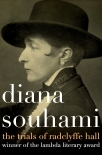The Trials of Radclyffe Hall by Diana Souhami (surface ebook reader .TXT) 📗

- Author: Diana Souhami
Book online «The Trials of Radclyffe Hall by Diana Souhami (surface ebook reader .TXT) 📗». Author Diana Souhami
Una knew exactly what to do. More of the same and then more of the same. All her symptoms of malaise disappeared. For the first time in years she was enjoying life. Evguenia’s desperation compensated for the loss of Florence, the Forecastle, Smallhythe. ‘Florrie is surly, morose, spotty and melancholy and gives us, thank God, not much of her society’, she wrote.
Evguenia stayed in her room for hours and ate alone. She heard Mrs Baker had died. Had she kept that connection she would probably have been a beneficiary of her will. John’s bank informed her that because of currency restrictions she was unlikely to be able to pay Evguenia an allowance were she to go to France. Evguenia ‘cried herself into swollen frightfulness and hints at suicide’, Una wrote. John told Evguenia she could not bear to think of her exposed to danger or illness and thrown on her own financial resources. She asked her to go with them to Italy if the war allowed. Evguenia said she would not do so for any reason. Una saw this as proof of her lack of love: ‘The rain pours down, the icy wind howls and I see all chances of keeping our home in commission vanishing down Florrie’s moloch maw. She is infinitely the strongest of us three, since John is handicapped by affection and I by scruples, while she knows not the meaning of either.’
Evguenia sought the help of a Dr Anderman. She went to him and cried. He tried counselling John and Una. He told Una not to fuss over John all the time or ask her every minute if she was comfortable or in pain. He advised John to get out of doors and said Evguenia’s rash was nervous and that she needed to get away. ‘My suspicions are confirmed,’ Una said, ‘that she has posed as the nerve shattered victim of an elderly hypochondriacal malade imaginaire and her hysterical accomplice to whom she is the indispensable bond slave.’
Anderman she dismissed as ‘that Cossack Jew’.
36
At the Wayside
Una refused Evguenia any domestic task then criticized her for not doing anything to help. When John caught a cold Una dosed her with anti-phlogiston, cough mixture, Sanatogen, malted milk and cocoa, took her temperature four times a day and would not leave her ‘because of the risk of Florrie making her ill in my absence’.
John then had gastric trouble for which she was given morphine. Dr Anderman thought she might have an ulcer and advised a stomach X-ray. He told Mrs Pidgeon, the proprietor of the hotel, that with ‘thoroughly nervous patients’ it was worth spending money on reassurance. Evguenia was thoroughly nervous too. She was admitted to hospital in Barnstaple. Una described her as a ‘horrible spectacle with blotched skin. The bill for Evguenia is £15. All for nettle rash caused by temper.’ She wrote malicious couplets about her:
I may despise the tender heart and bite the hand that feeds.
But I never despise the cheque book that supplies my daily needs.
‘God curse you’, Evguenia said to her.
A succession of doctors advised Evguenia to move away from John and Una. She moved to Exeter, got a job in a psychiatric hospital nursing German prisoners and stayed at the Osborne Hotel. Una described the hospital as full of drugged lunatics scowling in armchairs. Evguenia, she said, ‘languidly served meals to Nazi spies and Jew Bolshies’ and was not nursing anyone. John called it a ‘fearful asylum place among the loonies’ and insisted Evguenia leave. Which she did, but not to go back to Lynton. She returned her nursing badge, and enrolled to study art and French literature at Exeter University.
As late as March 1940 they were all hopeful that it would still be possible to leave England. John Holroyd-Reece, who was in France, thought he could arrange visas and the London Passport Office extended all their exit permits. John hoped the Bank of England would relax the rules about allowing money to be taken out of the country. But Hitler invaded Denmark and Norway, Mussolini joined forces with him and Italy became enemy territory. John and Una said Mussolini had been baited by the British government and the British press. They worried about their possessions in the via dei Bardi and about Fido in quarantine in Paris.
It was a bitter English winter. Snow swirled. ‘Our hours are spent indoors behind tightly shut windows’, Una wrote. She wore two vests, a woollen body belt, a flannel shirt, long-sleeved sweater, jodhpurs, a leather waistcoat and a lined tweed riding coat. At night she slept with two hot water bottles, three blankets, an eiderdown and rug.
She and John moved with their gas masks, the canary and John’s mandolins to the Imperial Hotel, Lynton, run by Mr and Mrs Chivers. John had a large bedroom and a sitting-room with views of the sea and the moors. She bought an antique desk in Barnstaple and hoped to start writing again. She was immensely relieved that Evguenia was safe and in the same county and that she could provide for her. Here, she felt, after all their vicissitudes, was proof of God’s care and guidance.
Suppose you had gone out of England at the beginning of the war – where should we be now? I ask you – I could not have got money to you & I would not be permitted to draw enough money (had I joined you) for all of us to live





Comments (0)